Social engagement activities for seniors significantly enhance mental health and reduce feelings of isolation. This article explores the benefits of these activities, effective examples like group exercises and creative arts, and best practices for caregivers in organizing inclusive events. Engaging in social activities can improve physical well-being and foster meaningful connections, ultimately enhancing the quality of life for older adults.
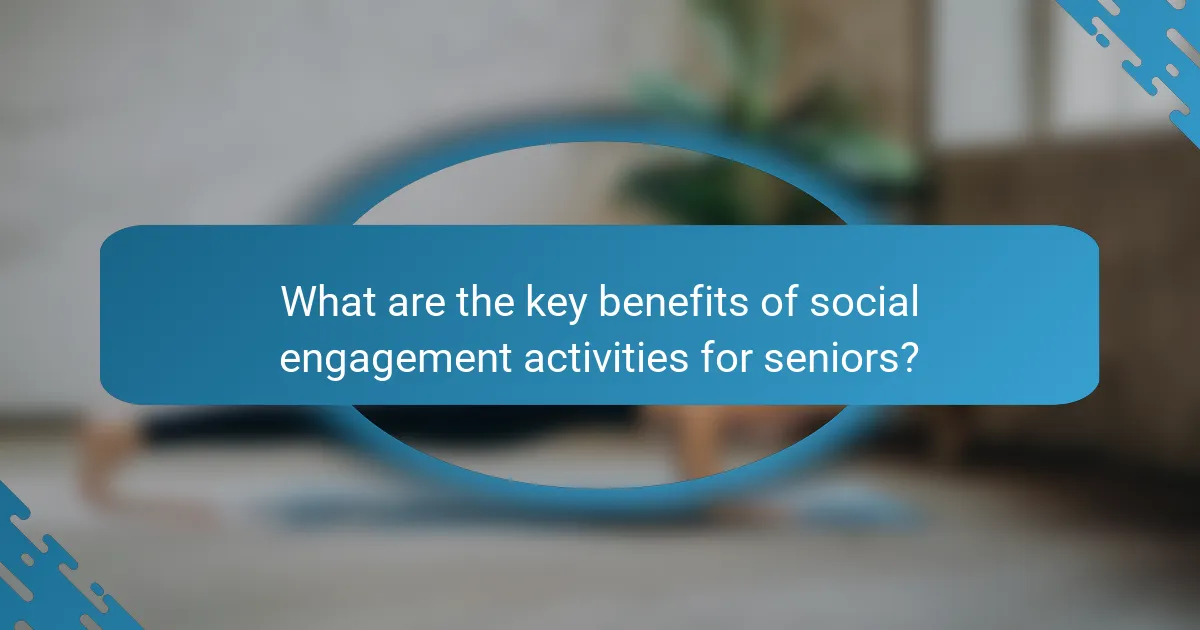
What are the key benefits of social engagement activities for seniors?
Social engagement activities for seniors enhance mental health, promote social connections, and improve physical well-being. These activities reduce feelings of isolation and loneliness, fostering a sense of belonging. Engaging in group activities can stimulate cognitive function and boost mood through social interaction. Regular participation in these events has been linked to lower rates of depression among older adults.
How do social activities improve mental health in older adults?
Social activities significantly enhance mental health in older adults by fostering connections and reducing feelings of isolation. Engaging in social interactions can lead to improved mood, increased cognitive function, and a greater sense of purpose.
Participation in group activities, such as exercise classes or community events, provides opportunities for socialization and support. Studies indicate that seniors involved in regular social activities experience lower rates of depression and anxiety.
Moreover, social engagement can stimulate cognitive processes, as conversations and shared experiences challenge the mind. This interaction can lead to a unique attribute of increased resilience against cognitive decline.
In summary, social activities serve as a vital component of mental health for older adults, promoting emotional well-being and cognitive vitality.
What physical health advantages come from social engagement?
Social engagement activities significantly enhance physical health by promoting increased mobility and reducing the risk of chronic diseases. Participating in social activities encourages seniors to stay active, which can lead to improved cardiovascular health and better muscle strength. Studies indicate that seniors engaged in regular social activities experience lower rates of depression and anxiety, contributing to overall well-being. Engaging with others also fosters a sense of purpose, which can motivate physical activity and healthy lifestyle choices.
How does social interaction reduce feelings of loneliness?
Social interaction significantly reduces feelings of loneliness by fostering connections and enhancing emotional well-being. Engaging in social activities promotes a sense of belonging and purpose, particularly for seniors. Regular participation in group activities, such as clubs or classes, can lead to improved mental health outcomes. Studies show that seniors who engage socially experience lower rates of depression and anxiety. Additionally, shared experiences during these activities create lasting bonds, reinforcing social networks that combat isolation.
What role does social engagement play in cognitive function?
Social engagement significantly enhances cognitive function in seniors. Participating in social activities can improve memory, attention, and overall mental health. Engaging with others reduces feelings of isolation and stimulates brain activity, which is crucial for maintaining cognitive abilities. Regular social interaction can lead to better emotional well-being, ultimately contributing to a healthier mind. Activities such as group games, community events, and shared hobbies offer practical ways for seniors to stay socially active and mentally sharp.
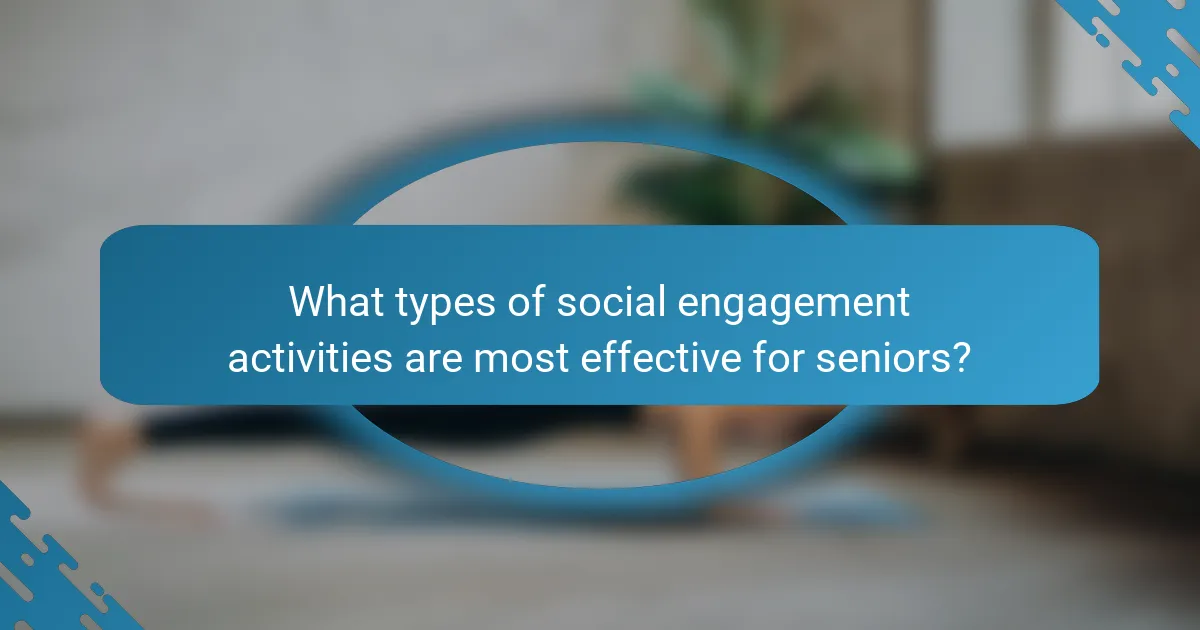
What types of social engagement activities are most effective for seniors?
Social engagement activities that are most effective for seniors include group exercises, creative arts, and social clubs. These activities foster community, enhance mental health, and improve physical well-being.
Group exercises, such as tai chi or yoga, not only promote physical fitness but also encourage social interaction. Creative arts, including painting and crafting, stimulate cognitive function and provide a sense of accomplishment. Social clubs, whether focused on books or hobbies, create a supportive environment that combats loneliness.
Research indicates that seniors participating in social engagement activities report higher levels of happiness and lower rates of depression. Prioritizing these activities can significantly enhance quality of life for older adults.
Which group activities foster community among seniors?
Group activities that foster community among seniors include exercise classes, arts and crafts, book clubs, and game nights. These activities enhance social interaction and promote mental well-being. For example, regular exercise classes not only improve physical health but also create a supportive environment. Similarly, arts and crafts allow for creative expression and social bonding. Book clubs encourage discussion and shared interests, while game nights stimulate cognitive function and camaraderie. Engaging in these activities can significantly reduce feelings of isolation among seniors.
What are the best practices for organizing group outings?
To organize group outings effectively, prioritize clear communication, accessibility, and engaging activities. Create a detailed plan that includes the outing’s purpose, location, and schedule. Ensure transportation options accommodate all participants, and consider their interests when selecting activities. Encourage feedback to improve future outings.
How do volunteer opportunities enhance social connections?
Volunteer opportunities significantly enhance social connections by fostering interactions among seniors. Engaging in community service allows seniors to meet new people, build friendships, and create a sense of belonging. Participation in these activities can lead to improved mental health and reduced feelings of isolation. Studies show that seniors involved in volunteer work report higher levels of happiness and life satisfaction. This social engagement supports emotional well-being and strengthens community ties, making it a vital aspect of senior living.
What role do technology-based activities play in social engagement?
Technology-based activities significantly enhance social engagement for seniors by facilitating communication and connection. These activities, such as video calls and online games, reduce feelings of isolation and promote mental stimulation. Studies show that seniors participating in tech-driven social interactions report higher satisfaction levels and improved emotional well-being. Additionally, unique attributes like personalized content and user-friendly interfaces cater to diverse skill levels, making technology accessible and enjoyable for older adults.
How can creative arts be used for social interaction?
Creative arts foster social interaction by encouraging collaboration and communication among seniors. Activities like painting, music, or dance promote emotional expression and build connections. Engaging in these arts enhances cognitive function and reduces feelings of isolation. For example, group art classes create a sense of community and shared experience, which are vital for social engagement.
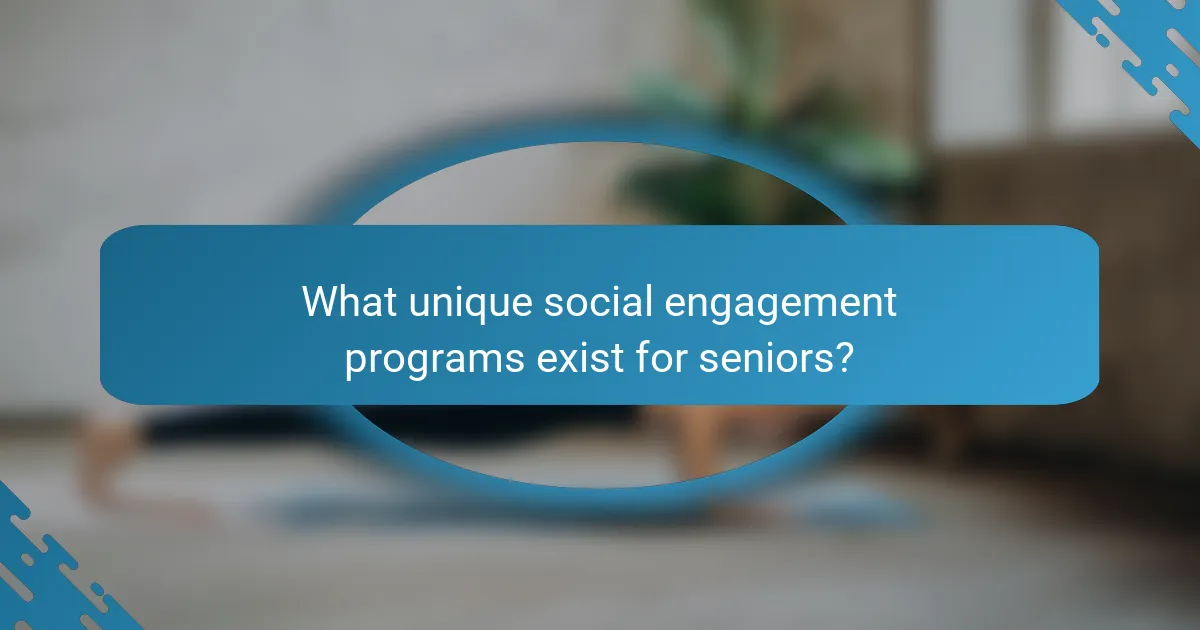
What unique social engagement programs exist for seniors?
Unique social engagement programs for seniors include intergenerational programs, community gardening, and technology workshops. These initiatives foster connections across age groups, enhance mental well-being, and promote skill development. For instance, intergenerational programs pair seniors with youth for shared activities, enriching both groups’ experiences. Community gardening allows seniors to engage with nature and socialize, while technology workshops help them navigate digital tools, bridging generational gaps. Such programs are vital in combating loneliness and enhancing the quality of life for seniors.
What are some innovative models of social engagement for older adults?
Innovative models of social engagement for older adults include technology-driven platforms, community-based programs, and intergenerational activities. These approaches foster connections, enhance mental health, and promote active lifestyles. For example, virtual reality experiences can simulate social interactions, while local volunteer opportunities encourage community involvement. Additionally, art and music therapy sessions create expressive outlets, boosting emotional well-being. Emphasizing inclusivity and accessibility ensures that diverse needs are met, enriching the lives of seniors.
How do intergenerational programs benefit seniors?
Intergenerational programs enhance seniors’ lives by fostering social connections and reducing isolation. These programs promote engagement through shared activities with younger generations, improving mental health and emotional well-being. Research indicates that participation can lead to a 20% increase in overall life satisfaction among seniors. Additionally, such interactions provide opportunities for skill sharing, creating a sense of purpose and belonging.
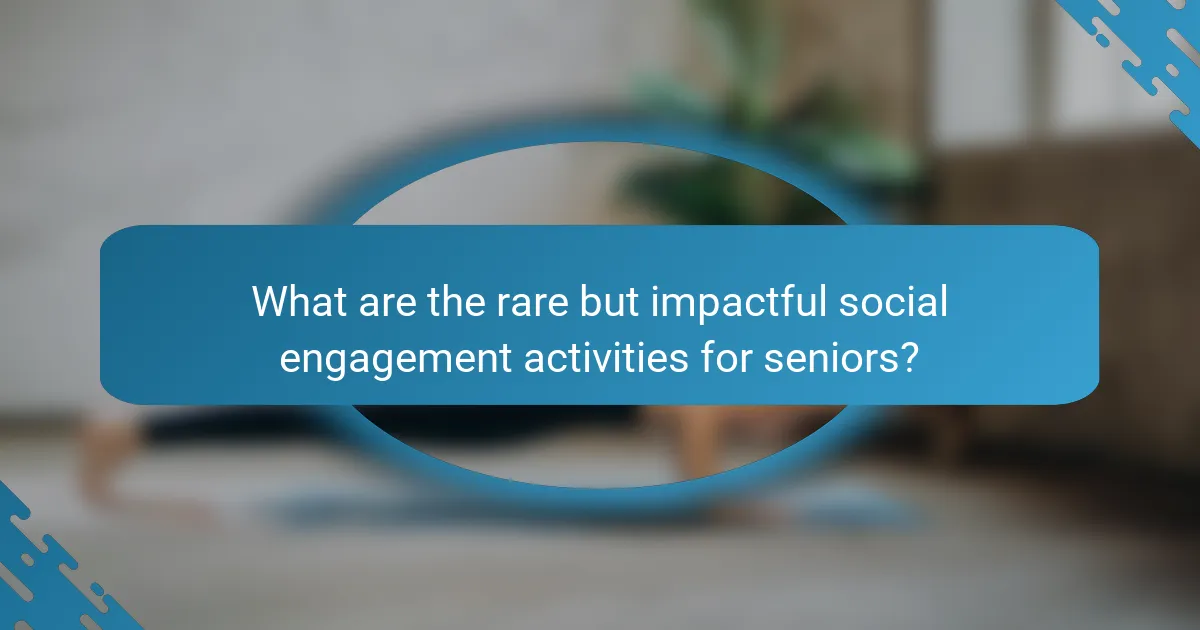
What are the rare but impactful social engagement activities for seniors?
Rare but impactful social engagement activities for seniors include intergenerational programs, art therapy sessions, and community gardening. These activities foster connection, creativity, and physical engagement while reducing isolation. Intergenerational programs promote bonding between seniors and youth, enhancing social skills and emotional support. Art therapy sessions allow seniors to express themselves creatively, improving mental well-being. Community gardening not only encourages physical activity but also cultivates a sense of purpose and achievement. Each of these activities uniquely enriches the lives of seniors, contributing to their overall quality of life.
How does pet therapy serve as a social engagement tool?
Pet therapy effectively serves as a social engagement tool by fostering connections between seniors and therapy animals. This interaction promotes emotional well-being and reduces feelings of loneliness.
Research indicates that pet therapy can enhance social skills and encourage communication among seniors, leading to improved mental health. Furthermore, participating in pet therapy sessions often creates opportunities for group interactions, facilitating friendships and community bonds.
The unique attribute of pet therapy lies in its ability to create a non-judgmental environment, allowing seniors to express themselves freely. As a result, seniors may experience increased motivation to engage in other social activities, enhancing their overall quality of life.
What is the impact of travel clubs on senior socialization?
Travel clubs significantly enhance senior socialization by providing structured opportunities for interaction. These clubs foster friendships and community connections through shared travel experiences. Participating in group trips encourages communication and collaboration among seniors, leading to improved mental health and reduced feelings of loneliness. Additionally, travel clubs often include activities tailored to seniors’ interests, promoting engagement and active lifestyles. Research shows that social interactions through such clubs can lead to a 30% increase in overall life satisfaction for seniors.
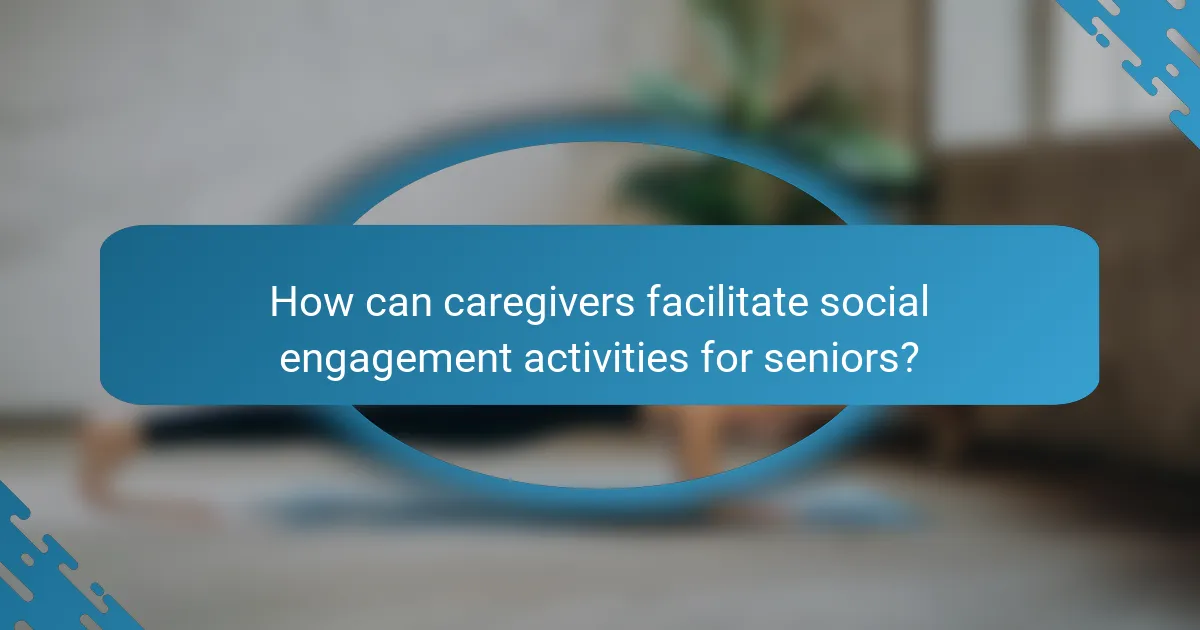
How can caregivers facilitate social engagement activities for seniors?
Caregivers can enhance social engagement for seniors by organizing activities that promote interaction and connection. Effective strategies include facilitating group games, arranging community outings, and encouraging participation in hobby clubs.
Group activities such as bingo or card games foster socialization and cognitive engagement. Community outings, like visits to parks or museums, provide fresh experiences and opportunities for conversation. Hobby clubs centered around interests like gardening or crafting create a sense of belonging and shared purpose.
Additionally, caregivers should consider the unique preferences and abilities of each senior, ensuring that activities are accessible and enjoyable. Regularly scheduled events can help build routine and anticipation, further enhancing social connections among seniors.
What strategies can be employed to encourage participation?
Encouraging participation in social engagement activities for seniors can be achieved through various strategies. Creating a welcoming environment fosters comfort and trust. Tailoring activities to individual interests increases motivation. Utilizing peer leaders enhances relatability and encourages involvement. Offering incentives, such as small rewards or recognition, boosts enthusiasm. Regular communication about upcoming events ensures awareness and anticipation.
How can caregivers assess the effectiveness of social activities?
Caregivers can assess the effectiveness of social activities by observing engagement levels and emotional responses. Monitoring participation rates, feedback from seniors, and changes in mood or social skills are crucial indicators. Regular evaluations help tailor activities to individual needs, enhancing overall well-being.
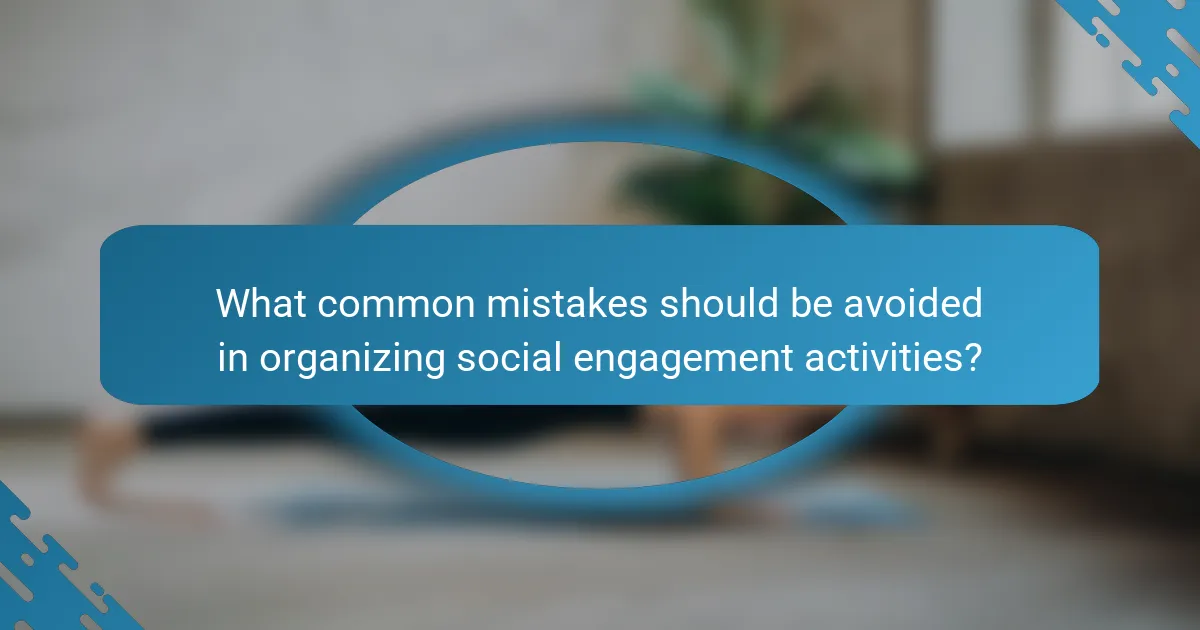
What common mistakes should be avoided in organizing social engagement activities?
To effectively organize social engagement activities for seniors, avoid common mistakes such as inadequate planning, neglecting individual preferences, and failing to promote inclusivity. Ensure activities are well-structured, cater to diverse interests, and encourage participation from all seniors. Prioritize clear communication and feedback to enhance future events.
How can one ensure inclusivity in social activities?
To ensure inclusivity in social activities for seniors, create environments that welcome diverse participants. Use adaptive strategies like varied activity types, accessible venues, and flexible scheduling. Engaging seniors with different abilities promotes social connection and enhances overall well-being.
What are the pitfalls of over-scheduling social events?
Over-scheduling social events can lead to stress and fatigue for seniors. It may diminish enjoyment and reduce the quality of interactions. Excessive commitments can cause feelings of overwhelm, impacting mental well-being. Prioritizing balance ensures meaningful engagement without negative consequences.
What are expert tips for maximizing the benefits of social engagement?
To maximize the benefits of social engagement for seniors, focus on fostering meaningful connections and participating in diverse activities. Encourage regular participation in group events, which can enhance mental well-being and reduce feelings of isolation. Promote activities like book clubs, gardening groups, or art classes that cater to varied interests, ensuring inclusivity. Additionally, leverage technology to facilitate virtual gatherings, allowing seniors to connect with family and friends remotely. Establishing a routine around these activities can provide structure and motivation, ultimately enriching their social lives.